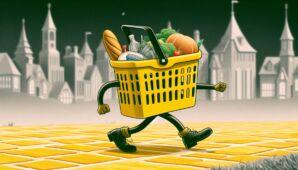Franc Goebbels, Managing Director, Annalect Netherlands on the Dutch Ad Space
by Romany Reagan on 23rd Jul 2012 in News

Franc Goebbels, Managing Director for Annalect in the Netherlands, chats with ExchangeWire on automated trading, the Dutch cookie law and why semantic targeting needs the human touch in his local market.
Can you give us some overview on the Accuen Netherlands operation?
As you may know, the OMD label is within the Omnicom Media Group, and Omincom Media Group is currently launching Annalect across the globe. Annalect has an automated trading unit that is referred to as Accuen, so all our automated trading and algorithmic buying goes through Accuen. We were one of the first companies in media to have a full-blown trading operation going within our network. We started out a little bit more than two and a half years ago, going ahead of the curve in our local market.
Is all your trading currently automated? If not, is that where you’re headed you think?
When trading is in the context of overall media buying, it is not. We see we really have to have an evolution in digital marketing, and automated trading can really help us achieve that evolution, especially where there’s IAB format. Basically, everything that is standardised should be automated. The main advantage of our focus on automation is basically the handling and operation of analytical media planning.
Can you explain how Annalect uses analytics?
In the end, analytics really helps us to achieve business value for clients, when we know what the business value that something generates is, we determine what the value of media contacts are. The main reason for us to do automated trading is not only the operational efficiency we achieve, but we focus on a quality automated trading proposition that is not just buying exchange remnant inventory, like everybody else seems to be doing, we focus on our primary publisher relations to really have a quality automated trading solution.
Would you say that brand spend is flowing more into the RTB channel?
Yes, at some point it will. It’s starting to emerge. The whole discussion is currently on reach, or actual size-impact or creative-impact. Automated used to be a remnant inventory only story, but we see it being utilised as a branding tool or a reach tool more and more, and that is exactly where we think it should be as well. A very big misconception is that RTB suddenly made display advertising performance-only, but it can serve all possible media and marketing objectives -- from branding and awareness to direct response.
How damaging is the cookie law in the Netherlands likely to be for automated trading?
It will definitely be very damaging for everything that is currently retargeting-based, and it will set back the development of the data ecosystem in general. We currently do not see the big US technology companies in the ecosystem coming up with real alternatives for the cookie law. Of course we are working on our own alternatives to cookies, but it’s a process.
It’s a good thing, because actually cookie-based data trading is a process as well, everything still works in Powerpoint, but actually getting the complete technology stack up and running and getting everything working together, that’s the real challenge at the moment.
You say you’ve been working on cookie alternatives, have you discovered anything so far?
You can generate a lot of information from unique PC settings. Some of the components of those settings offer opportunities to alternatively generate profiles.
Do you think that semantic targeting will become even more important in the Dutch market?
It will be important, but the technology providers offering semantic targeting currently offer it mainly in English. We found our local language to be hard to automatically process. The algorithmic interpretation of semantic targeting, whether it’s for social media, sentiment analysis or content analysis, just does not do the trick. Since our local language is not covered very well by algorithmic interpretation, operators are limited to tech providers that offer human interpretation. That is already very important and will only further gain in importance.
How do you feel the Dutch market is placed in the space?
The tech developments might not be Holland-based, but the innovative thinking and smart application definitely is. We’re a small, very crowded and highly competitive market. So we need to push ahead!
What are some big trends you’re noticing at the moment?
We’ll see a very big impact from Google’s consolidation of the stack, and basically we are trying to achieve the same, like maybe everybody is! Then of course the European, or maybe worldwide, discussion regarding cookies and privacy, but that’s a no-brainer. In the end, all real trends evolve around user behaviour and about business value -- and everything that lies between is something that should be considered. Whether is RTB, mobile social or even the more traditional media.
What we really find interesting is many of the big-volume technology providers to the international- market don’t seem to look beyond their own silo. For example, everybody seems to leave TV as-is, whilst we see that real opportunity lies there!
Can you elaborate on that opportunity?
Meaning you can interpret analytics data and attribute it to, say for instance, a real-time bidding campaign, but the dynamics completely change as soon as there is a television campaign going on. So actually, we’re making relations in terms of behaviour on the value of combined media.
There have been a lot of studies on cross-platform usage recently showing users are often on their laptops while watching TV, ect.
There are a lot of studies on simultaneous use, but when you simply overlay the data it’s a no brainer. Television influences the value we generate from algorithmic trading, or search, or social. What I really can’t get my head around is everybody thinks in silos. We’ve got our social specialists, our search specialists, our algorithmic traders, our TV planners, people in the ecosystem just think in silos. But whenever we learn about user behaviour in social, we act on it in search, and through algorithmic trading -- it’s all interconnected and that’s exactly what the revolution will be.
So you think the future lies not in specialism, but that people will be a little bit of an expert in everything?
It goes back to the basics. We need to get experts in user behaviour and in business value -- because business value is what makes the world go round, and user behaviour is what generates business value. We need to have a whole new set of tools and technology to really go and find the holy grail of marketing.
Where do you think Annalect is going? What do you see in the future for the industry in general?
If you ask me personally, for our local market, we need to really understand our clients’ business and to structurally connect to audiences. We need to create and learn how to operate a toolbox, a tech-stack to help us achieve both.
As always, the changes will go very slowly due to the nature of the marketing ecosystem. However, I anticipate a future in real-time marketing, where a lot of business decisions and action is in real time, including media. From a media perspective, at some point in the future we’ll have real-time-bidded TV advertising.
That seems like it would be difficult as it’s not easily as tracked.
That’s currently the status, however some aspects of the marketing ecosystem change too slowly, others (for example the emergence of RTB) change faster than a lot of marketers imagined.TV as a real-time bidding channel in five years does not seem completely strange, we’ll of course also have the video and mobile real time trading that is happening right now. I think TV would be a very good next stage, especially as we have a lot of connected TV stuff going on at the moment.
Within five years, we’ll have a completely different landscape, and I’m thinking it could happen even sooner than everyone is expecting at the moment. I see the current electronics producers like Sony, LG, Samsung, all beefing up to go into battle for connected TV, including Google, Hulu, Apple -- everybody seems to be focusing on an endgame that might be referred to as “TV”. It’s happening sooner than I would’ve expected, but already starting to happen. It’s not acknowledged yet though...
Ad NetworkAnalyticsBrandingDataDisplayEMEAProgrammaticTargetingVideo








Follow ExchangeWire